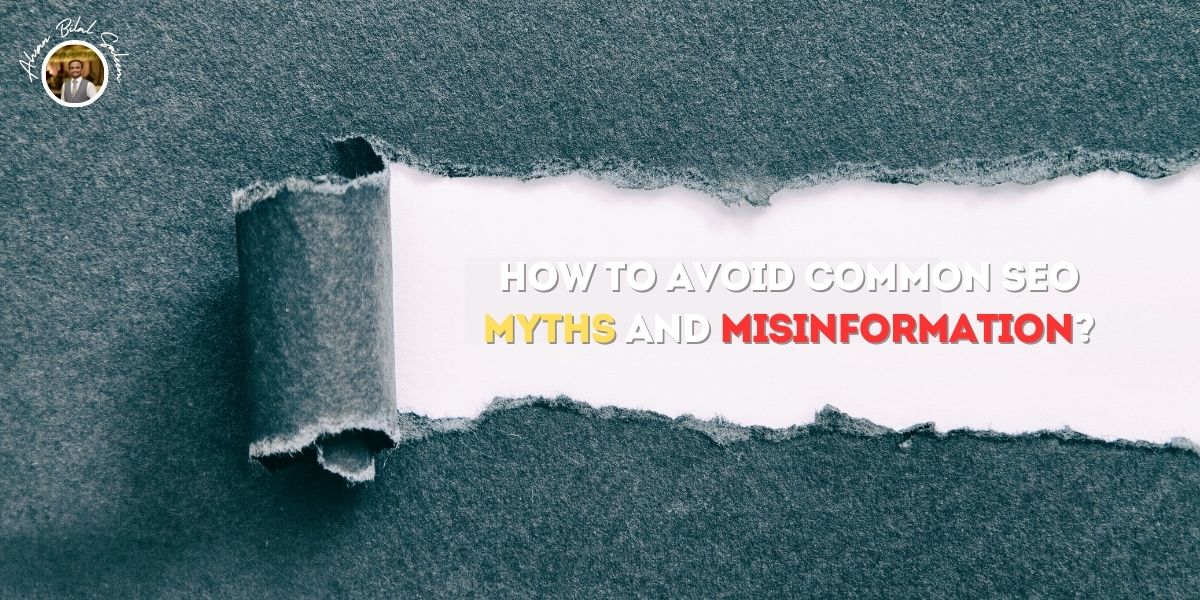How To Avoid Common SEO Myths And Misinformation?
In the ever-evolving world of SEO, it’s easy to come across a lot of advice, tips, and strategies. However, not all of the information circulating is accurate. In fact, SEO myths and misinformation can mislead website owners, causing them to adopt ineffective strategies that waste time, hurt rankings, and hinder long-term growth. Avoiding these common misconceptions is crucial to implementing an effective SEO strategy that produces results. Here’s a breakdown of the most prevalent SEO myths and how to avoid falling for them.
Myth: SEO is a One-Time Task
Truth: SEO is an Ongoing Process
One of the most common misconceptions is that SEO is something you can set up once and forget about. This belief can be highly detrimental to your website’s growth. SEO is not a one-time task but rather an ongoing process that requires continuous monitoring, updates, and optimization.
Google’s algorithms are constantly changing, and so are your competitors. Regularly updating your content, analyzing your keyword strategy, improving site speed, and building backlinks are essential practices to maintain and improve your rankings over time.
How to Avoid This Myth:
- Set up a regular schedule to audit your website for SEO.
- Keep up-to-date with Google algorithm changes and trends in SEO.
- Continuously update your content to keep it relevant and valuable.
Myth: Keyword Stuffing Improves Rankings
Truth: Quality Over Quantity
Keyword stuffing is the practice of excessively loading your content with target keywords, believing this will boost rankings. This outdated practice not only fails to improve your position but can actually harm your website. Google’s algorithms, especially after updates like Panda and Hummingbird, penalize sites that overuse keywords unnaturally.
Instead of cramming keywords into every sentence, focus on using them naturally within high-quality, relevant content that serves the needs of your audience. Keyword density is as of now not a variable; it’s about setting and significance.
How to Avoid This Myth:
- Prioritize writing for humans first, and search engines second.
- Use keywords sparingly and only where they fit naturally.
- Focus on semantic SEO—using related terms that reinforce the topic of your content.
Myth: More Backlinks Automatically Lead to Higher Rankings
Truth: Quality of Backlinks Matters More Than Quantity
While backlinks are a crucial ranking factor, the idea that “the more backlinks, the better” is a misleading notion. Not all backlinks are created equal. Joins from bad quality or unimportant locales can cause more damage than great. Google places significant emphasis on the quality, relevance, and authority of the sites linking back to you.
A few high-quality backlinks from authoritative, trustworthy websites are far more valuable than hundreds of low-quality ones.
How to Avoid This Myth:
- Focus on building relationships with reputable websites for backlinks.
- Abstain from purchasing backlinks or participating in connect plans that abuse Google’s rules.
- Regularly audit your backlink profile to remove any harmful or low-quality links.
Myth: Social Media Signals Directly Impact SEO Rankings
Truth: Social Media Can Boost Visibility, but Doesn’t Directly Affect Rankings
There is a persistent myth that social media metrics—likes, shares, and followers—directly influence SEO rankings. While social media is a powerful tool for driving traffic and increasing visibility, Google has stated that social signals are not a direct ranking factor.
However, social media can indirectly impact SEO by helping your content gain visibility, generating traffic, and potentially attracting backlinks from other sites. The more eyes on your content, the better chance you have of it being shared and linked to by reputable sources.
How to Avoid This Myth:
- Use social media to amplify your content but don’t rely on it as a ranking strategy.
- Focus on creating content that engages users on social platforms, which may lead to valuable backlinks.
- Measure social media success by referral traffic and engagement, not SEO impact.
Myth: You Must Submit Your Site to Google to Rank
Truth: Google Will Find Your Website Without Submission
Some people believe they need to manually submit their site to Google in order to rank. While submitting a sitemap to Google Search Console can be helpful in speeding up the indexing process, it is not necessary. Google’s bots regularly crawl the web, finding new pages and websites without needing manual submission.
The most effective way to get your site indexed is to create valuable, crawlable content that naturally attracts Google’s attention. An updated sitemap, fast-loading pages, and a solid internal linking structure can also help ensure efficient indexing.
How to Avoid This Myth:
- Use Google Search Console to monitor how Google indexes your site, but don’t worry about manual submission.
- Ensure your website has a clean structure and clear navigation for easy crawling.
- Focus on building quality content that will naturally attract Google’s crawlers.
Myth: Meta Descriptions Directly Influence Rankings
Truth: Meta Descriptions Affect Click-Through Rates, Not Rankings
Many people believe that meta descriptions, those brief snippets shown in search results, are a direct ranking factor. While meta descriptions don’t directly influence search engine rankings, they do impact your click-through rates (CTR). An elegantly composed, convincing meta portrayal urges clients to tap on your outcome, which can work on your traffic and in a roundabout way help rankings through higher client commitment.
How to Avoid This Myth:
- Compose compact, powerful meta depictions that tempt clients to click.
- Use primary keywords in meta descriptions, not for ranking purposes, but to signal relevance to users.
- Focus on providing a clear value proposition in your meta descriptions.
Myth: More Pages Mean Better Rankings
Truth: Quality Content is What Matters, Not Quantity
Some website owners think that creating more pages, regardless of quality, will improve their chances of ranking higher. However, Google values the quality and relevance of content far more than the sheer number of pages. Thin, low-quality content can harm your site’s performance and lead to penalties.
Instead of focusing on quantity, ensure every page on your site offers real value, is well-researched, and addresses the needs of your audience.
How to Avoid This Myth:
- Focus on creating fewer, but higher-quality pages with in-depth content.
- Regularly audit your site to remove or update outdated or irrelevant pages.
- Improve existing content to better serve user intent and increase relevance.
Conclusion
SEO myths and misinformation are widespread, but by staying informed and focusing on proven, best-practice strategies, you can avoid costly mistakes. Remember, SEO is a long-term game. Success requires consistent effort, high-quality content, and keeping up-to-date with changes in algorithms and search engine behaviors. By debunking these common myths, you’ll be able to build a solid SEO foundation that drives sustainable, long-term growth for your website.










